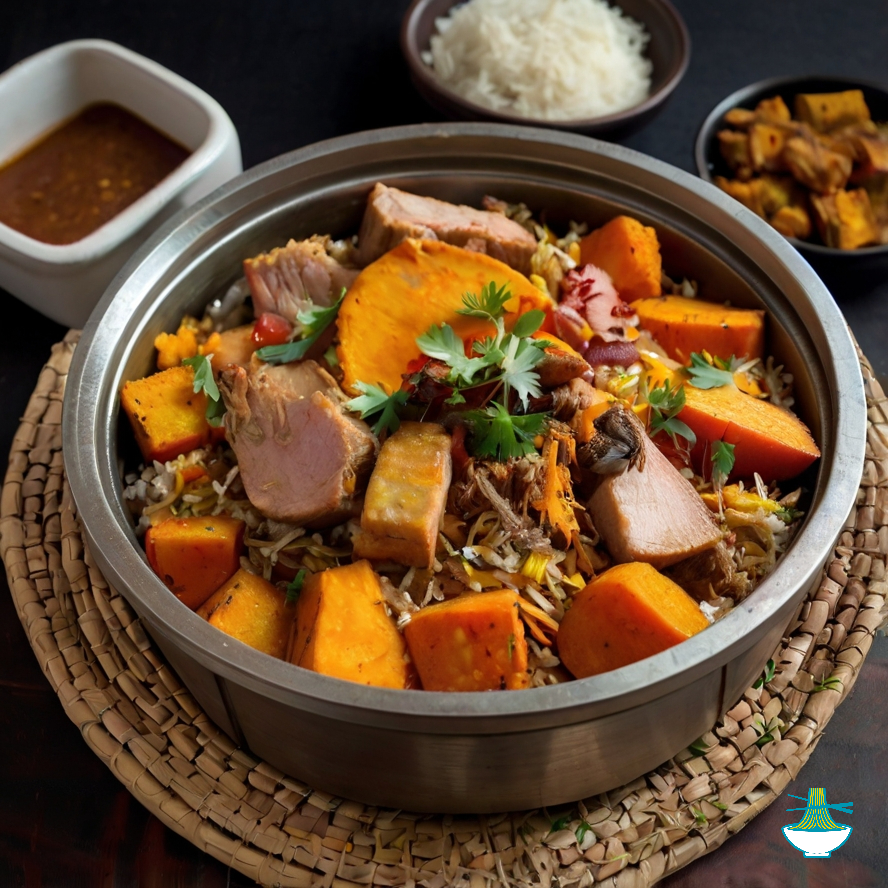Explore the cultural significance of Mumu, a traditional Pacific Islander dish with pork, sweet potatoes,and vegetables,cooked in an earth oven for rich flavor.
This dish reflects the region's rich culinary heritage and cultural significance.
Ingredients:
- 2-3 pounds pork shoulder or pork belly, cut into large chunks
- 4-5 large sweet potatoes, peeled and cut into chunks
- 2 cups uncooked rice
- Assorted vegetables (such as carrots, cabbage, pumpkin, and green beans), washed and chopped
- Banana leaves (or aluminum foil if banana leaves are not available)
- Salt and pepper to taste
- Water

Instructions:
Prepare the earth oven: If you have access to an earth oven (umu), dig a pit in the ground and line it with rocks. Start a fire in the pit and let it burn until the rocks are hot. If you don't have an earth oven, you can use a large roasting pan or Dutch oven in the oven or on a grill.
Season the pork chunks with salt and pepper to taste.
Layer the ingredients: On the bottom of the earth oven (or roasting pan), place a layer of banana leaves or aluminum foil. Arrange the pork chunks on top of the leaves. Then add a layer of sweet potato chunks, followed by a layer of rice. Finally, add the chopped vegetables on top.
Add water: Pour enough water over the ingredients to create steam during cooking. Be careful not to add too much water, as you don't want the Mumu to become watery.
Cover and cook: Cover the Mumu with more banana leaves or aluminum foil to trap the steam. If you're using an earth oven, cover the pit with more hot rocks and then cover with dirt to seal in the heat. Let the Mumu cook for 2-3 hours, or until the pork is tender and the vegetables are cooked through.
Serve: Carefully uncover the Mumu and serve the tender pork, sweet potatoes, rice, and vegetables hot from the earth oven. Enjoy the delicious flavors of this traditional Pacific Islander dish!
Feel free to adjust the ingredients and cooking time according to your preferences and the size of your gathering.
Nutritional Values :
Pork (per 3-ounce serving):
- Calories: 250
- Protein: 25 grams
- Fat: 16 grams
- Carbohydrates: 0 grams
- Cholesterol: 75 milligrams
- Sodium: 65 milligrams
benefits:
- Protein Source: Pork is a good source of high-quality protein, essential for building and repairing tissues in the body.
- Vitamins and Minerals: It contains important nutrients such as B vitamins (including B12), zinc, selenium, and phosphorus, which are vital for various bodily functions including metabolism, immune function, and bone health.
- Iron: Pork provides heme iron, which is more easily absorbed by the body compared to non-heme iron found in plant-based sources. Iron is necessary for the production of red blood cells and oxygen transport.
Sweet Potatoes (per 1/2 cup serving, boiled without salt):
- Calories: 90
- Protein: 2 grams
- Fat: 0 grams
- Carbohydrates: 21 grams
- Fiber: 3 grams
- Sugar: 7 grams
- Vitamin A: 380% DV
- Vitamin C: 30% DV
- Potassium: 400 milligrams
benefits:
- High in Fiber: Sweet potatoes are rich in dietary fiber, which promotes digestive health, helps regulate blood sugar levels, and may aid in weight management by promoting feelings of fullness.
- Vitamins and Antioxidants: They are loaded with vitamins A, C, and E, as well as antioxidants like beta-carotene. These nutrients support immune function, vision health, and may reduce the risk of chronic diseases.
- Complex Carbohydrates: Sweet potatoes are a good source of complex carbohydrates, providing sustained energy and helping to stabilize blood sugar levels.
Rice (per 1/2 cup serving, cooked):
- Calories: 110
- Protein: 2 grams
- Fat: 0 grams
- Carbohydrates: 25 grams
- Fiber: 0.5 grams
- Sugar: 0 grams
benefits:
- Energy Source: Rice is a staple food and an excellent source of carbohydrates, which serve as the body's primary source of energy.
- Low in Fat: It is naturally low in fat and cholesterol, making it a heart-healthy choice when consumed in moderation.
- Gluten-Free: Rice is naturally gluten-free, making it suitable for individuals with gluten intolerance or celiac disease.
Assorted Vegetables (per 1/2 cup serving, mixed):
- Nutritional values can vary widely depending on the specific vegetables used. As a general guideline, most vegetables are low in calories and fat and rich in vitamins, minerals, and dietary fiber.
benefits:
- Nutrient Density: Vegetables are packed with essential vitamins, minerals, and phytonutrients while being low in calories. Consuming a variety of vegetables provides a wide range of nutrients necessary for overall health and well-being.
- Fiber: Most vegetables are rich in dietary fiber, which promotes digestive health, helps maintain a healthy weight, and reduces the risk of chronic diseases such as heart disease and diabetes.
- Antioxidants: Many vegetables contain antioxidants such as vitamins A, C, and E, as well as phytonutrients like flavonoids and carotenoids, which help protect cells from damage caused by free radicals and may reduce the risk of chronic diseases.
Keep in mind that these values are approximate and can vary based on factors such as cooking methods, portion sizes, and specific ingredient choices. If you're following a specific diet or have dietary restrictions, it's best to consult with a nutritionist or use a reliable nutrition calculator to get more accurate information based on your recipe and serving sizes.


Comments